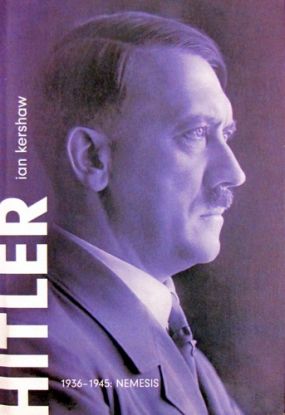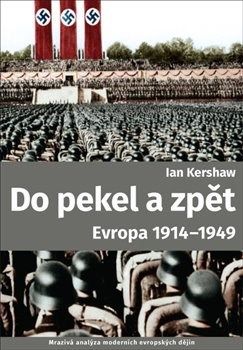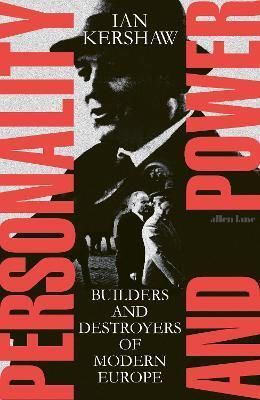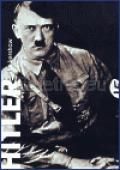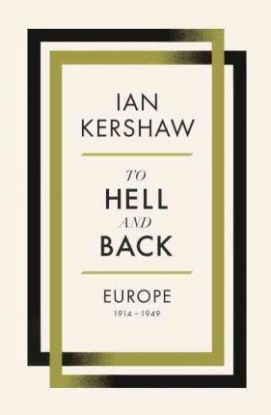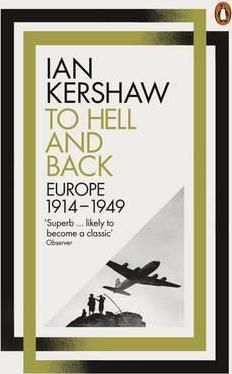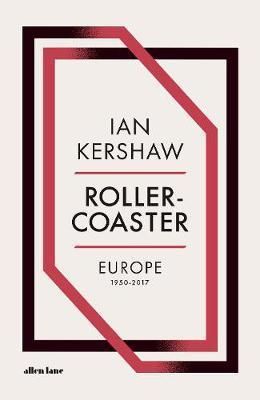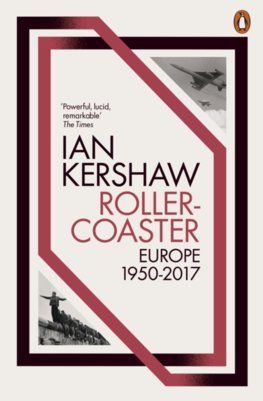Ian Kershaw
autor
Hitler 1936 - 1945 : NEMESIS
V prvním díle své monumentální biografie Adolfa Hitlera, dovedeném do počátku roku 1936, anglický historik Ian Kershaw přesvědčivě vykreslil vůdce nacistického hnutí jako talentovaného a prostřelého demagoga, který se dokázal ve složitých poměrech Výmarské republiky vypracovat z rakouského snílka ve vůdce nacistické strany a posléze nacistického státu. Ve druhém díle, který je vynikající analýzou posledních devíti let Hitlerova života, v nichž vedl nacistický diktátor německý stát a německý národ od nacionální euforie ke zničující válce a konečné bezpodmínečné kapitulaci, Ian Kershaw dále rozvádí svůj závěr, že příčiny Hitlerova úspěchu lze spatřovat jen v jeho osobnosti, ale současně i v motivech a jednání jeho okolí. Příčiny Hitlerovy neomezené moci ve Třetí říši pak musíme podle něj hledat nejen v Hitlerových samotných činech, ale současně i v sociálních vztazích německého státu let 1933-1945, které umožnily nacistickému vůdci překročit všechny institucionální a morální hranice. Proto Ian Kershaw mimo jiné důsledně odmítá v Hitlerově kariéře patos vůle a historické vyvolenosti. Nejde ale tak daleko, aby Adolfa Hitlera vnímal pouze jako produkt dlouhodobé politické a společenské krize v Německu první poloviny dvacátého století. Detailně se zaobírá i Hitlerovým duchovním ustrojením, které ovlivňovalo nejen jeho zdravotní stav či jeho úvahy o sebevraždě, ale také spoluurčovalo i samotnou podobu nacistické politiky v éře Třetí říše.
Hitler 1889-1936 Hybris
Monumentální práce předního britského historika Iana Kershawa představuje dosud nejucelenější a nejrozsáhlejší životopis vůdce nacistického hnutí. V prvním díle se čtenář seznámí nejprve s Hitlerovým původem, rodinným prostředí a dospíváním. Setká se tu s Hitlerovým jediným skutečně blízkým druhem, Augustem Kubizkem, chlapcem českého původu, v jehož společnosti Hitler prožil formující období svého mladí. Poté autor podrobně sleduje „vůdcův“ dobrovolný vstup do armády v době první světové války, počátky politické dráhy, nezdar v mnichovském puči, jeho překonání a následnou cestu k převzetí moci. Za pomoci nejnovějších pramenů, mimo jiné obohacených nedávným zpřístupněním bývalých sovětských archivů, metodou spojení biografického přístupu a studia dějin společnosti předkládá jak obraz Hitlerova nitra, tak společenských dějů, tolik osudových nejen pro Německo, ale i pro celý svět 20. století.
Do pekel a zpět
Renomovaný britský historik moderních dějin Ian Kershaw, mj. autor životopisu Adolfa Hitlera vydaného v nakladatelství Argo, se v devíti kapitolách své nové práce věnuje nejtragičtějšímu období evropských dějin 20. století. Po analýze konce zlatého věku v Evropě se zabývá první světovou válkou a jejími příčinami, sleduje vzestup Hitlera a nacismu v Německu, popisuje katastrofu druhé světové války a její důsledky, včetně zárodků nového poválečného uspořádání Evropy. Hlavní příčiny evropských tragédií v první polovině 20. století vidí v růstu rasově vyhraněného nacionalismu, neslučitelných zájmech imperialistických velmocí i v důsledcích vyhroceného třídního boje, gradujícího především bolševickou revolucí v Rusku. Velmi čtivým způsobem se smyslem pro detail tak čtenářům nabízí odpovědi na otázky, které jsou stále aktuální.
Na sklade 1Ks
31,25 €
32,89 €
A pokolba és vissza – Európa 1914–1949
A 20. század első fele Európa katasztrófákkal átszőtt korszaka, az emberiség történetének példátlanul erőszakos, drámai és egyúttal lebilincselő időszaka. Ian Kershaw kötete átfogó tudósítást ad a történelem e sűrű szövésű periódusáról, az I. világháború kitörését megelőző időszaktól kezdve Hitler felemelkedésén keresztül a II. világháborút követő európai hatalmi berendezkedés sajátosságaiig. Bemutatja a történelemformáló karaktereket és a háborúk erőszakos sokkhatását az európai társadalmak történetére. A szerző négy fő tényezőt határoz meg az európai kataklizmák kiváltó okaként: az etnikai alapú nacionalizmust, a csillapíthatatlan revizionista törekvéseket, a feloldhatatlan osztályellentéteket, amelyek az oroszországi forradalomban konkrétan testet is öltöttek, valamint a kapitalizmus agóniáját. A metszően pontos, brilliánsan megírt mű bepillantást enged az európai történelem viharos korszakába, amely máig hatóan alakította nemcsak a kontinens, hanem az egész világ történetét is.
dostupné aj ako:
A pokolba és vissza
A 20. század első fele Európa katasztrófákkal átszőtt korszaka, az emberiség történetének példátlanul erőszakos, drámai és egyúttal lebilincselő időszaka. Ian Kershaw kötete átfogó tudósítást ad a történelem e sűrű szövésű periódusáról, az I. világháború kitörését megelőző időszaktól kezdve Hitler felemelkedésén keresztül a II. világháborút követő európai hatalmi berendezkedés sajátosságaiig. Bemutatja a történelemformáló karaktereket és a háborúk erőszakos sokkhatását az európai társadalmak történetére. A szerző négy fő tényezőt határoz meg az európai kataklizmák kiváltó okaként: az etnikai alapú nacionalizmust, a csillapíthatatlan revizionista törekvéseket, a feloldhatatlan osztályellentéteket, amelyek az oroszországi forradalomban konkrétan testet is öltöttek, valamint a kapitalizmus agóniáját. A metszően pontos, brilliánsan megírt mű bepillantást enged az európai történelem viharos korszakába, amely máig hatóan alakította nemcsak a kontinens, hanem az egész világ történetét is.
Na stiahnutie
11,24 €
dostupné aj ako:
Európa ?globális története 1950–2017
A világszerte nagyra becsült brit történész nagyszabású Európa-történetének második része.A 20. század első felének borzalmas eseményeit összegző, A pokolba és vissza című kötet után Sir Ian Kershaw az 1950-től 2017-ig tartó időszakot tekinti át. Ezek az évtizedek békét és legalább viszonylagos jómódot hoztak a kontinens népei számára. Európa arculatát immár nem a vérontás és a rombolás, hanem a gazdasági fellendülés formálta. A világháború hosszú árnyéka azonban a mind távolabbi múltból is rávetült a megosztott földrészre. A két világrend szembenállása, a nukleáris fenyegetés, valamint a felívelő és válságba zuhanó gazdasági ciklusok miatt az európaiak hullámvasúton érezhették magukat. Azt tapasztalhatták, hogy nem irányítói saját sorsuknak, csupán sakkfigurák az Egyesült Államok és a Szovjetunió hidegháborús játszmájában. A korszak végét mégis megdöbbentő sikerek jelölték ki: Európai pártállami diktatúrái eltűntek, a két Németország egyesült, a Szovjetunió megszűnt létezni. A gyorsuló globalizáció viszont újfajta kockázatokat, veszélyforrásokat nyitott fel. A 2008 után egymásba fonódó válságok egyértelműen figyelmeztetnek: nincs garancia a békére és a stabilitásra. Mértékadó munkájában Ian Kershaw széles panorámát mutat fel a világról, amelyben élünk. A Hullámvasút nemcsak a „nagypolitika” fordulatait elemzi a kontinens minden régiójára vonatkozóan, hanem rávilágít a hétköznapok történetére is, és mindezzel arra készteti az olvasót, hogy feltegye és meg is válaszolja a kérdést: mit jelent európainak lenni.
Na stiahnutie
16,34 €
Personality and Power
One of the great historians of our age asks: how far can a single leader alter the course of history?
The modern era saw the emergence of individuals who had command over a terrifying array of instruments of control, persuasion and death. Whole societies were re-shaped and wars fought, often with a merciless contempt for the most basic norms. At the summit of these societies were leaders whose personalities had somehow given them the ability to do whatever they wished.
Ian Kershaw's new book is a compelling, lucid and challenging attempt to understand these rulers, whether operating on the widest stage (Lenin, Stalin, Hitler, Mussolini) or with a more national impact (Tito, Franco). What was it about these leaders and the times they lived in that allowed them such untrammelled and murderous power? And what brought that era to an end? In a contrasting group of profiles, from Churchill to de Gaulle, Adenauer to Gorbachev, and Thatcher to Kohl, Kershaw uses his exceptional skills to think through how other, strikingly different figures wielded power.
Hitler 1889-1936:HYBRIS
Monumentální práce předního britského historika Iana Kershawa představuje dosud nejucelenější a nejrozsáhlejší životopis vůdce nacistického hnutí. V prvním díle se čtenář seznámí nejprve s Hitlerovým původem, rodinným prostředí a dospíváním. Setká se tu s Hitlerovým jediným skutečně blízkým druhem, Augustem Kubizkem, chlapcem českého původu, v jehož společnosti Hitler prožil formující období svého mladí. Poté autor podrobně sleduje „vůdcův“ dobrovolný vstup do armády v době první světové války, počátky politické dráhy, nezdar v mnichovském puči, jeho překonání a následnou cestu k převzetí moci. Za pomoci nejnovějších pramenů, mimo jiné obohacených nedávným zpřístupněním bývalých sovětských archivů, metodou spojení biografického přístupu a studia dějin společnosti předkládá jak obraz Hitlerova nitra, tak společenských dějů, tolik osudových nejen pro Německo, ale i pro celý svět 20. století.
Vypredané
26,26 €
27,64 €
Konec: Německo 1944-45
Na téma porážky a konce nacistického Německa byl napsán již bezpočet knih. Dosud žádná se však do hloubky nezabývala zásadními otázkami, které se v souvislosti s jeho koncem nutně nabízejí. Co pohánělo Německo k tomu, aby dál bojovalo, ačkoli bylo jasné, že válka je prohraná? Jak rozkládající se hitlerovský stát v rozbité zemi dokázal vůbec dýchat až do momentu, než Rudá armáda stanula u budovy Říšského kancléřství? Proč se německý národ nezachoval jako v roce 1918 a nevzepřel se režimu, jenž jej v posledních měsících vystavil brutálnímu teroru a který celou zemi očividně vedl do záhuby? Proč armáda stále poslušně plnila Hitlerovy nesmyslné rozkazy? Do jaké míry se na sebezničujícím kurzu podílel strach a fanatismus Němců? A jakou roli v agonickém a zarputilém vzdoru třetí říše měl spojenecký požadavek bezpodmínečné kapitulace?Na to se pokouší odpovědět ve své nové knize Konec: Německo 1944–45 Ian Kershaw, uznávaný britský historik a expert na éru nacistického Německa. Komplexní, poutavé a zároveň velmi drastické líčení finálních měsíců existence hitlerovského státu, protkané citacemi z dobových úředních dokumentů, soukromých dopisů a deníkových zápisů, začíná nezdařeným atentátem na Hitlera v červenci 1944 a končí diktátorovou smrtí a kapitulací v květnu 1945. Text je opatřen hutným poznámkovým aparátem a doplňuje jej jedinečná fotografická příloha spolu s mapkami.
Vypredané
24,46 €
25,75 €
Příběh Operace Valkýra
Stauffenbergův atentát na Adolfa Hitlera z 20. července 1944 byl nejpropracovanějším pokusem o odstranění nacistického diktátora za celou dobu existence Třetí říše. Ačkoli plány na Hitlerovo zavraždění, vycházející jak z armádních kruhů, tak od izolovaných jednotlivců, byly mnohem staršího data a některé z nich došly i praktické realizace, teprve akce hraběte Stauffenberga ohrozila Hitlera přímo na životě a svým spojením s přípravou převratu, který by svrhl nacistický režim jako takový, představovala vyvrcholení snah odpůrců režimu. Kniha Iana Kershawa Příběh Operace Valkýra sestává ze tří kapitol převzatých z jeho dvousvazkové biografie o Adolfu Hitlerovi a doplňují ji četné dokumenty přímých aktérů dramatu – ty v českém překladu zčásti vycházejí vůbec poprvé.
Vypredané
12,96 €
13,64 €
Qu'est-ce que le nazisme?
Dès sa parution en France en 1992, l'ouvrage de Ian Kershaw s'est imposé comme une indispensable référence. En effet, le retard pris par l'école historique française dans l'étude du national-socialisme est inquiétant, alors qu'à l'étranger les travaux sur le nazisme ne se comptent plus. Au point que même le spécialiste a du mal en faire le tour. Quant au phénomène lui-même, il soulève de façon aiguë un certain nombre de problèmes théoriques d'interprétation d'une redoutable compléxité. Aussi n'est-il par surprenant que les étudiants aient quelque difficulté à s'orienter dans le dédale des analyses et contre-analyses dont l'histoire de l'Allemagne moderne continue de faire l'objet. On comprend dès lors l'impact qu'a eu et continue d'avoire Qu'est-ce que le nazisme ? Ian Kershaw dégage les problèmes clefs d'interprétation de la dictature nazie, explique de manière concise les zones d'ombre ou les débats qui demeurent, montre comment les historiens d'horizons différents les ont traités et, enfin, tente d'évaluer les positions en présence. Cette nouvelle édition augmentée - notamment de deux chapitres inédits sur la résistance allemande et sur la place du nazisme dans la conscience nationale de l'Allemagne réunifiée -, et dont tous les autres chapitres ont été mis à jour, aidera le public à se familiariser, grâce à un historien du nazisme internationalement reconnu, avec des analyses et des controverses touchant à un phénomène déterminant pour l'histoire du XXe siècle : la dictature nazie.
Vypredané
20,14 €
21,20 €
End
Ian Kershaw's "The End" is a gripping, revelatory account of the final months of the Nazi war machine, from the failed attempt to assassinate Hitler in July 1944 to the German surrender in May 1945. In almost every major war there comes a point where defeat looms for one side and its rulers cut a deal with the victors, if only in an attempt to save their own skins. In Hitler's Germany, nothing of this kind happened: in the end the regime had to be stamped out town by town with an almost unprecedented level of brutality. Just what made Germany keep on fighting? Why did its rulers not cut a deal to save their own skins? And why did ordinary people continue to obey the Fuhrer's suicidal orders, with countless Germans executing their own countrymen for desertion or defeatism?
Vypredané
12,34 €
12,99 €
To Hell and Back
In the summer of 1914 most of Europe plunged into a war so catastrophic that it unhinged the continent's politics and beliefs in a way that took generations to recover from. The disaster terrified its survivors, shocked that a civilization that had blandly assumed itself to be a model for the rest of the world had collapsed into a chaotic savagery beyond any comparison. In 1939 Europeans would initiate a second conflict that managed to be even worse - a war in which the killing of civilians was central and which culminated in the Holocaust. To Hell and Back tells this story with humanity, flair and originality. Kershaw gives a compelling narrative of events, but he also wrestles with the most difficult issues that the events raise - with what it meant for the Europeans who initiated and lived through such fearful times - and what this means for us.
Vypredané
31,30 €
32,95 €
To Hell and Back - Europe, 1914-1949
In the summer of 1914 most of Europe plunged into a war so catastrophic that it unhinged the continent's politics and beliefs in a way that took generations to recover from. The disaster terrified its survivors, shocked that a civilization that had blandly assumed itself to be a model for the rest of the world had collapsed into a chaotic savagery beyond any comparison. In 1939 Europeans would initiate a second conflict that managed to be even worse - a war in which the killing of civilians was central and which culminated in the Holocaust.
To Hell and Back tells this story with humanity, flair and originality. Kershaw gives a compelling narrative of events, but he also wrestles with the most difficult issues that the events raise - with what it meant for the Europeans who initiated and lived through such fearful times - and what this means for us.
Vypredané
18,00 €
18,95 €
Roller-Coaster
From one of Britain's most distinguished historians and the bestselling author of Hitler, this is the definitive history of a divided Europe, from the aftermath of the Second World War to the present.
After the overwhelming horrors of the first half of the 20th century, described by Ian Kershaw in his previous book as having gone 'to Hell and back', the years from 1950 to 2017 brought peace and relative prosperity to most of Europe. Enormous economic improvements transformed the continent. The catastrophic era of the world wars receded into an ever more distant past, though its long shadow continued to shape mentalities.
Europe was now a divided continent, living under the nuclear threat in a period intermittently fraught with anxiety. Europeans experienced a 'roller-coaster ride', both in the sense that they were flung through a series of events which threatened disaster, but also in that they were no longer in charge of their own destinies: for much of the period the USA and USSR effectively reduced Europeans to helpless figures whose fates were dictated to them by the Cold War. There were striking successes - the Soviet bloc melted away, dictatorships vanished and Germany was successfully reunited. But accelerating globalization brought new fragilities. The impact of interlocking crises after 2008 was the clearest warning to Europeans that there was no guarantee of peace and stability.
In this remarkable book, Ian Kershaw has created a grand panorama of the world we live in and where it came from. Drawing on examples from all across the continent, Roller-Coaster will make us all rethink Europe and what it means to be European.
Vypredané
30,88 €
32,50 €
Roller-Coaster
From one of Britain's most distinguished historians and the bestselling author of Hitler, this is the definitive history of a divided Europe, from the aftermath of the Second World War to the present.
After the overwhelming horrors of the first half of the 20th century, described by Ian Kershaw in his previous book as having gone 'to Hell and back', the years from 1950 to 2017 brought peace and relative prosperity to most of Europe. Enormous economic improvements transformed the continent. The catastrophic era of the world wars receded into an ever more distant past, though its long shadow continued to shape mentalities.
Europe was now a divided continent, living under the nuclear threat in a period intermittently fraught with anxiety. Europeans experienced a 'roller-coaster ride', both in the sense that they were flung through a series of events which threatened disaster, but also in that they were no longer in charge of their own destinies: for much of the period the USA and USSR effectively reduced Europeans to helpless figures whose fates were dictated to them by the Cold War. There were striking successes - the Soviet bloc melted away, dictatorships vanished and Germany was successfully reunited. But accelerating globalization brought new fragilities. The impact of interlocking crises after 2008 was the clearest warning to Europeans that there was no guarantee of peace and stability.
In this remarkable book, Ian Kershaw has created a grand panorama of the world we live in and where it came from. Drawing on examples from all across the continent, Roller-Coaster will make us all rethink Europe and what it means to be European.
